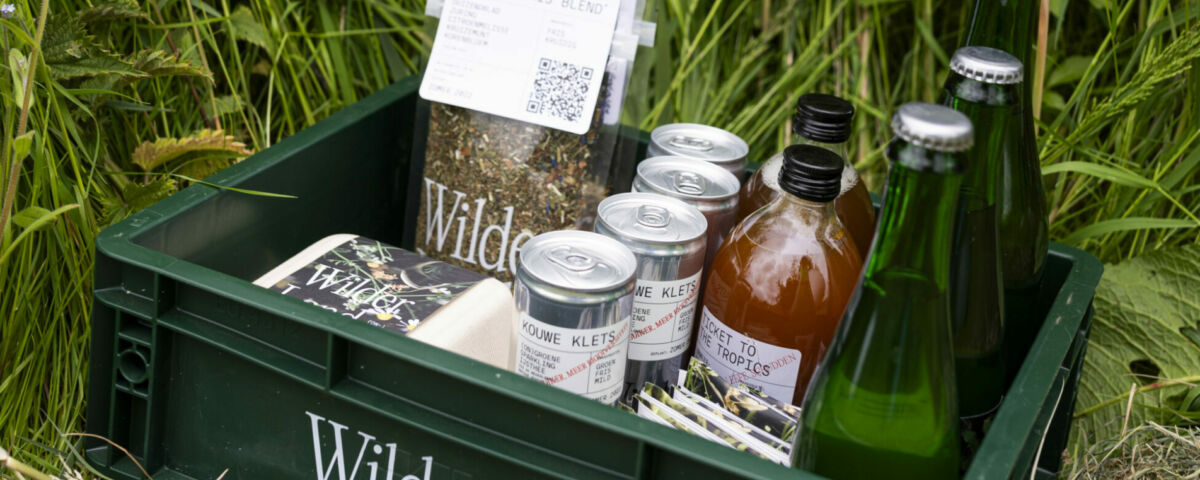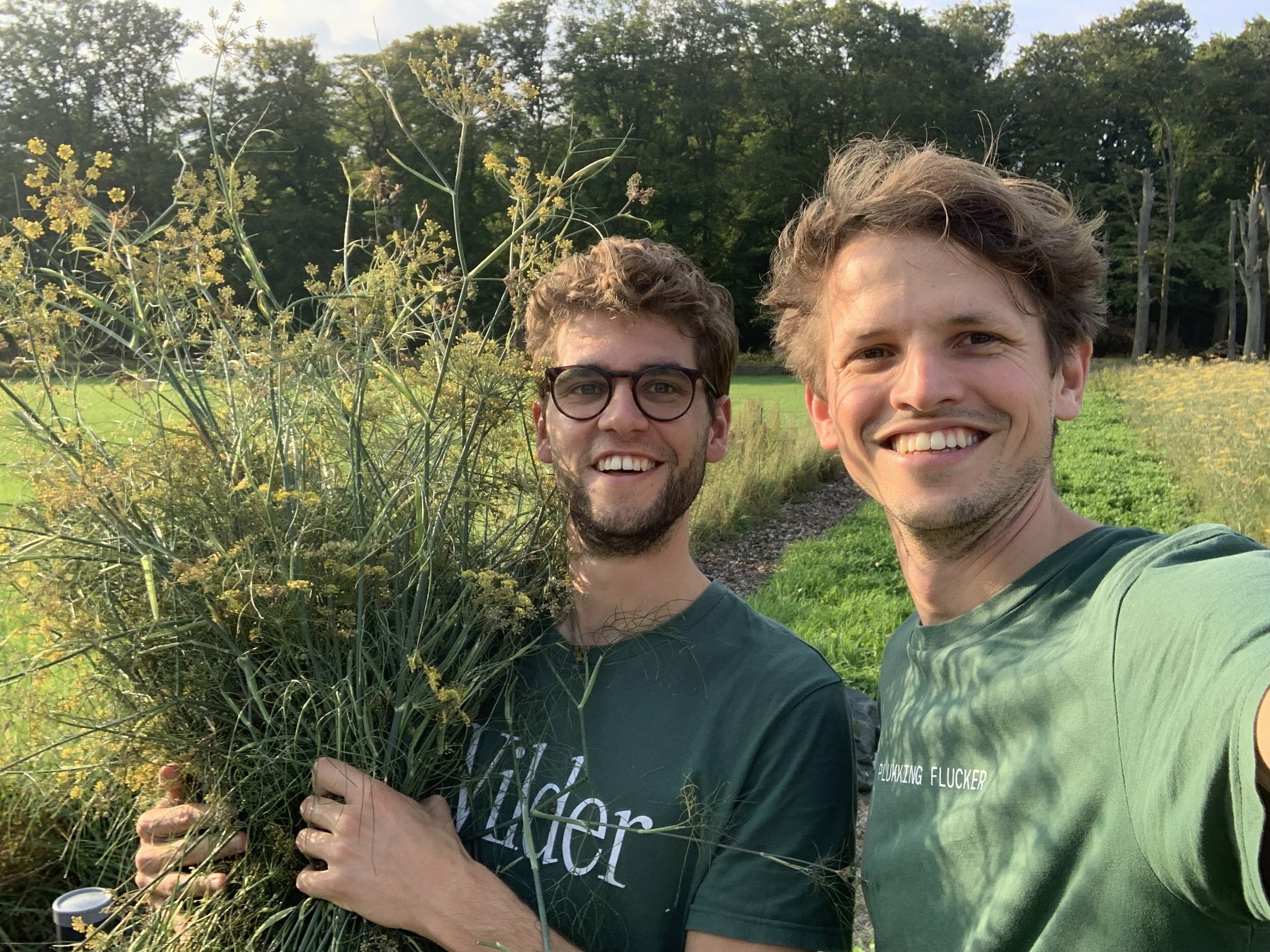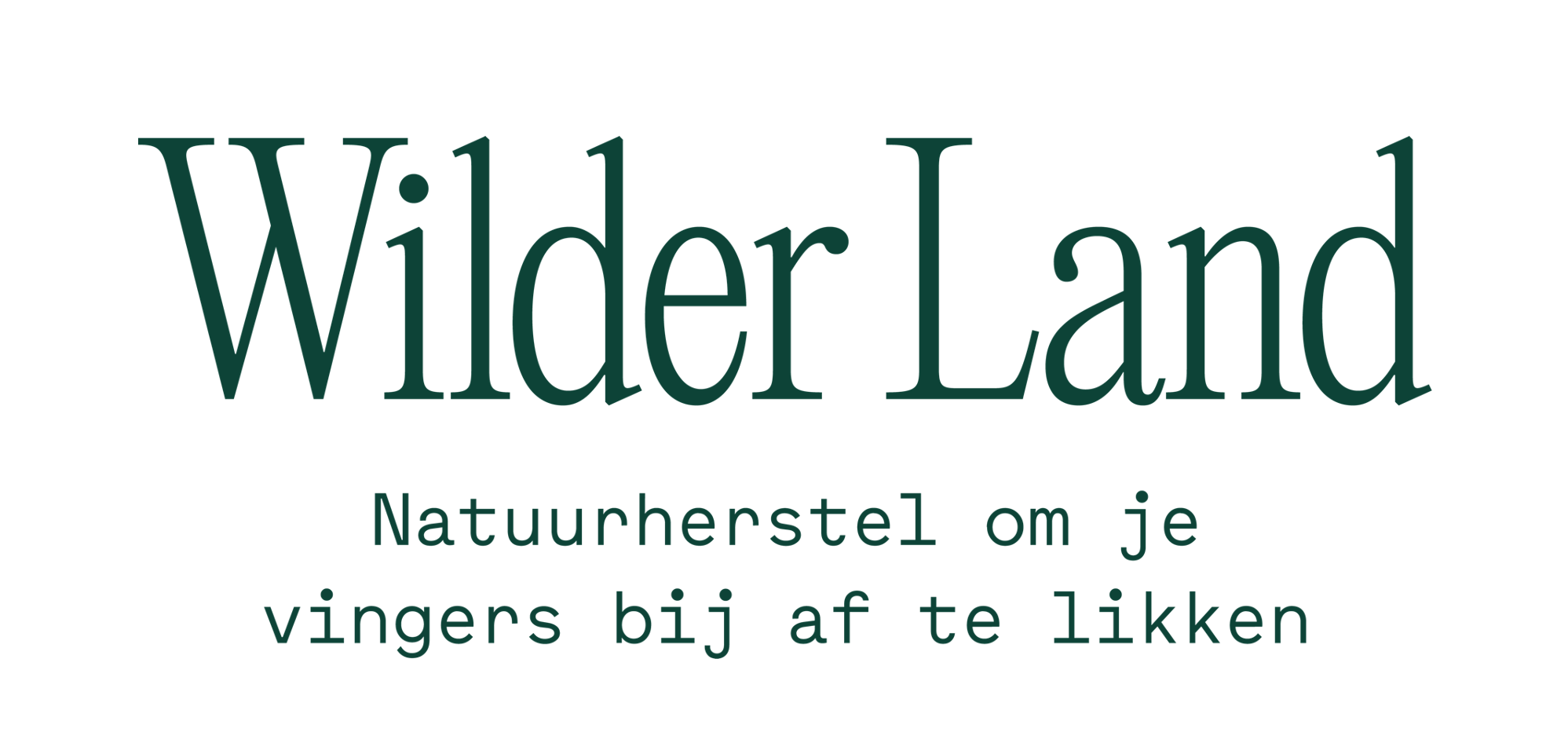




Keep this story going! Share below!
Wilderland is a sustainable Dutch SME that focuses on the production and distribution of resources for native organic food products to combat biodiversity loss and reduce distribution chains. The founders started from scratch, quit their jobs after seeing a sustainability documentary from ‘’Tegenlicht’’, to be independent in pursuing a more sustainable future.
When Daan van Diepen and Matthijs Westerhoudt launched their company in 2018 in Amsterdam, they had a logical and clear vision of their core product: hand-harvested herbal teas. Their raw resources would be grown on Dutch farmland, using only native species. This put them on the map for their short-chain approach and also highlighted a beautiful heritage of Western European flora, which is usually overlooked. They approached reliable farmers and established great relations from the get-go: not selling them on the ultimate viewpoint of how Dutch agriculture should be, but on what realistically could be done. Ambitious and idealistic, but also pragmatic and business savvy. Everyone should get their fair share. ‘’You have farmland to spare that you can’t use, so we have a proposition for you’’. Honesty and transparency are at the forefront, underlined with a good, healthy dose of optimism. Their branding and communication are vibrant and refreshing, as they try to get great native products to the masses. This approach was productive, as it greatly increased their product line, from teas to kombucha, artisan granolas and more natural, delicious goodness. They grew from selling from a webshop to selling directly through subscriptions, restaurants and wholesalers, blending mainstream reach with ecological authenticity.

“After watching Tegenlicht’s documentary on Dutch biodiversity, I knew we had to turn monocultures into thriving ecosystems,” says Daan van Diepen. The documentary exposed “green deserts” of monoculture (25% of Netherlands grasslands) lacking insect life, threatening food systems. Daan and Matthijs resolved to integrate nature into agriculture rather than reduce harm. Both founders also sought freedom from traditional corporate hierarchies: a venture that aligned with their wish for personal autonomy and their goal of ecological restoration. This form of mission-led entrepreneurship is also the reason they have no other shareholders. No one to report to except themselves, the customer and the goal.
Wilder Land shows how a regenerative business model can restore biodiversity while driving economic success. By transforming neglected farmlands into living nature corridors through the cultivation of wild herbs for tea, Wilder Land directly contributes to SDG 15 (Life on Land) and SDG 12 (Responsible Consumption and Production). In just a few years, the company has partnered with 35 farmers and built a scalable model that balances ecological restoration with local economic development. Their efforts have already resulted in a noticeable return of biodiversity, with fields that were previously biologically inactive now supporting a range of native plants and insects.
In the short term, this innovation has generated remarkable traction, with €1.2 million in revenue last year and a projection of €2 million this year. With a permanent team of seven and around 20 total staff, they make sure to have close alignment on vision and operations. Furthermore, the founders emphasise that positive branding, focusing on what we can protect rather than what problems we face, has been key to their success.
In the long run, Wilder Land aims to expand its local-sourcing model to other EU markets, scaling impact while preserving its core values. By stating, ‘In the next 5 to 10 years we want to be like Patagonia,’ Wilder Land emphasises its commitment to remaining mission-driven and independent of shareholder control. The company intends to be in control of both the founders, even while expanding its business model across the EU.
Their approach proves that sustainability and business viability are not mutually exclusive but require trade-offs and intentional design. As the co-founder put it, “People need nature, but nature doesn't need people” a powerful reminder of what’s at stake and what’s possible.
Wilder Land’s innovation has strengthened the business on multiple levels. By converting underused farmland into productive areas for wild herb cultivation, they’ve created a niche market with strong consumer demand. This focus on ecological regeneration through tea products has led to significant financial growth, with revenue rising from €1.2 million to a projected €2 million within a year. Their mission-driven model attracts a loyal customer base that values authenticity and impact, opening up new market segments both online and through partnerships with restaurants and retailers.
Internally, their values-based approach has contributed to strong employee engagement and team cohesion. The company maintains a lean but committed workforce, with seven core staff and around 20 collaborators. The clear purpose of the business fosters a culture of pride and long-term retention. Additionally, the diversification into products like kombucha and granola allows Wilder Land to scale while maintaining its core identity. This expansion has positioned the company as an attractive partner for investors who prioritize sustainable and ethical business practices, creating new growth opportunities without sacrificing independence.
Wilder Land delivers clear environmental benefits by restoring biodiversity on former monoculture or fallow lands. Through the planting of native wild herbs, they create nature corridors that support pollinators, regenerate soil health, and reintroduce native species to ecosystems where they had disappeared. These corridors not only reconnect fragmented habitats but also contribute to long-term ecological resilience. The shift away from intensive agriculture helps mitigate the effects of land degradation, erosion, and loss of biodiversity—issues that are central to SDG 15.
Socially, Wilder Land offers a meaningful alternative for farmers seeking to transition to more sustainable practices. By partnering with local growers under fair and transparent terms, the company enables rural communities to benefit economically without compromising environmental values. This creates a ripple effect of responsible land use and local empowerment. Their model also raises public awareness about the interconnectedness of nature, farming, and consumption habits. By demonstrating that ecological health and human wellbeing are interdependent, Wilder Land contributes to a broader cultural shift toward sustainability.
Get stories of positive business innovations from around the world delivered right to your inbox.
Daan van Diepen, Co-Founder

Wilderland is a sustainable Dutch SME that focuses on the production and distribution of resources for native organic food products to combat biodiversity loss and reduce distribution chains.